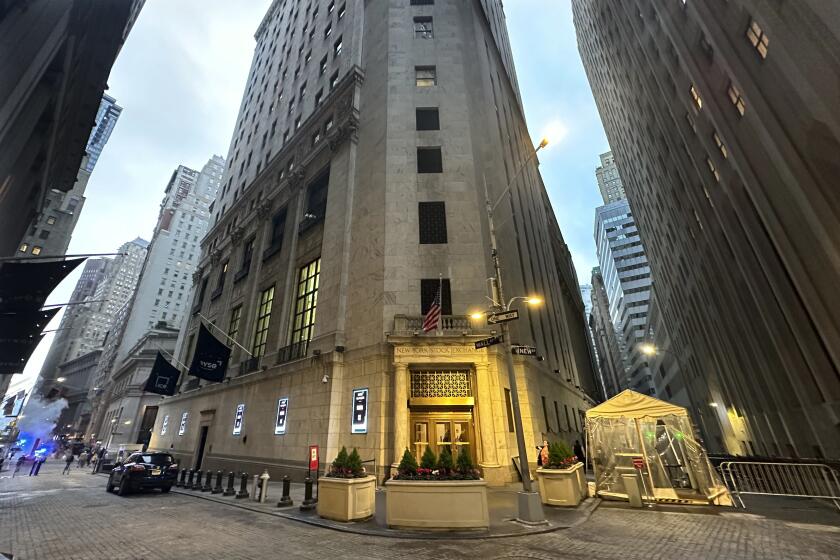Dow Loses 150 on Latin, Asian Turmoil; Bond Yields Tumble
U.S. stocks followed Asian and Latin American markets sharply lower Tuesday, while the dollar continued to soar against the beleaguered Japanese yen.
Meanwhile, U.S. bond yields took their biggest tumble in three weeks, helped by “safe haven” buying, new hints of a slowing economy and another plunge in commodities.
On Wall Street, the Dow Jones industrials slumped 150.71 points, or 1.7%, to 8,963.73, the biggest one-day loss since Jan. 9.
The broad market was exceedingly weak, as losers swamped winners by 2,235 to 870 on the New York Stock Exchange, though in moderate trading.
The U.S. market overall has been sliding for several weeks, but that hadn’t been reflected in blue chips. The Dow has hovered near its record close of 9,211.84 set May 13.
By contrast, the Nasdaq composite--which fell 26.91 points, or 1.5%, to 1,778.09 on Tuesday--now is off 7.3% from its record close of 1,917.61 reached April 22.
Fresh worries about Asia’s economic turmoil, and the potential for spillover into Latin America and other emerging economies, finally triggered blue-chip selling Tuesday, traders said.
South Korea’s stock market hit an 11-year low Tuesday, with the main stock index diving 6% to 311.99, amid mounting fears over corporate bankruptcies and labor unrest.
Asian market declines, and the dollar’s strength, then hammered Latin America, clipping 3% to 6% off the region’s major stock markets and pushing the Mexican peso to a record low. (Story, D1)
*
Some U.S. investors are growing more concerned that corporate earnings--which rose in the first quarter at the weakest pace since 1991--will remain depressed as exports to troubled emerging markets slow, and as the U.S. economy loads up with imports cheapened by the dollar’s strength.
Given the profit outlook, “there’s no compelling reason to buy stocks,” said Lan Janecek, who oversees $50 billion in retirement funds as chief investment officer for U.S. equities at the Florida State Board of Administration. “Funds are looking to cut back on equities rather than add to them.”
What was bad for stocks on Tuesday, however, was good for bonds. Yields fell across the board, with the bellwether 30-year Treasury bond yield dropping from 5.90% on Friday to 5.83%--the lowest since April 7.
The bond market was encouraged by two economic reports pointing to slower U.S. growth: The Conference Board said its May consumer confidence index declined to 135.2 from a revised 137.2 in April. And the National Assn. of Realtors said sales of existing homes fell 2.5% in April to a 4.77 million-unit annualized rate.
*
What’s more, Japanese investors may have been lured into U.S. bonds by the soaring dollar, which boosts the value of U.S. securities owned by foreigners. The dollar rose as high as 138.15 yen--highest since Aug. 20, 1991--amid speculation that Japan may let the yen weaken further to revive its struggling economy.
“I’m bullish on the bond market,” said Daniel Seitz, who helps manage $2 billion in bonds at Advisers Capital Management in Santa Barbara. “The dollar is strong, [and] it looks like the economy is at least starting to cool off.”
Falling commodity prices also point to lower inflation and lower interest rates, some analysts say. The Commodity Research Bureau index of 17 raw materials sank 1.5% on Tuesday to its lowest in nearly five years, as grain prices dropped after heavy Midwest rains and as gold fell $4.30 to $295.40 an ounce.
As for U.S. stocks, some veteran Wall Streeters are worried that the trends in other markets suggest a steeper decline lies ahead.
Morgan Stanley Asset Management Chairman Barton Biggs, a longtime bear, this week recommended that clients scale back further on U.S. stocks and put the proceeds in short-term liquid securities. “The tone of equity markets around the world is deteriorating,” Biggs said. “After so many false alarms, a serious decline finally could be coming.”
Among Tuesday’s highlights:
* Blue-chip weakness was concentrated in industrial giants that would have the most to lose from deeper global economic woes. DuPont fell $2.94 to $79.50, GE lost $2.19 to $82.81, GM dropped $1.81 to $74.19 and Union Carbide was off $1.88 to $50.88.
Also, automated-teller machine maker Diebold plummeted $8.88 to $30.88 after the firm said current-quarter earnings won’t meet estimates because banks are grappling with mergers and year-2000 computer issues, not buying ATMs.
* Among consumer names, Disney drooped $4.56 to $111.75.
* Recently high-flying Internet-related stocks also were hammered. Internet search vehicle Yahoo fell $6.13 to $108.25, Infoseek dropped $3.63 to $22.38, EarthLink lost $4.13 to $50, Broadcom tumbled $5.06 to $50.94 and K-Tel International slumped $3 to $17.69.
Many other tech issues were weak as well, including Apple Computer, down $1.19 to $26.69; Microsoft, down $1.94 to $83.63; and Dell, down $1.69 to $83.94.
* Biotech issues were lower, as Amgen fell $4.94 to $60.63. It surged last week on takeover rumors.
* Airlines were among the few strong groups, as Delta gained $1.69 to $114.94 and Southwest rose 63 cents to $27.06.
In foreign trading, the Tokyo stock market managed a gain of 0.6% despite the yen’s weakness. And Europe remained a bright spot: The Frankfurt market soared 1.2% to a record high, and Paris stocks also hit new highs on continuing optimism about Europe’s economic prospects this year.
Market Roundup, D10






